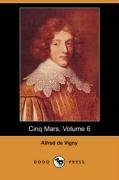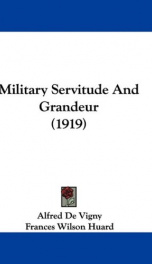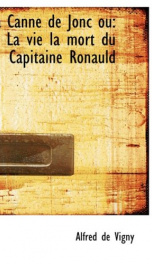cinq mars volume 6

Alfred Victor de Vigny (1797-1863) was a French poet, playwright, and novelist. Always attracted to letters and verses in French history and in knowledge of the Bible, he began to write poetry. He published his first poem in 1820, published an ambitious narrative poem entitled Eloa in 1824 on the popular romantic theme of the redemption of Satan, and in 1826, he collected his recent works in Poèmes Antiques et Modernes. Three months later, he published a substantial historical novel, Cinq Mars; with the success of these two volumes, he seemed to be the rising star of the burgeoning Romantic movement, though this role would soon be usurped by one of his best friends, Victor Hugo. In 1845, after several unsuccessful attempts to be elected, he became a member of the Académie Française. In his later years he spent much time preparing the posthumous collection of poems now known as Les Destinées which concludes with his final message to the world, L'Esprit Pur. His other works include: Le Bal (1820), Stello (1832), Quitte Pour la Peur (1833), Chatterton (1835) and Daphné (1912).
Info about the book
Author:
Series:
Unknown
ASIN:
B004TOTC98
Rating:
5/5 (2)Your rating:
0/5
Languge:
English
Users who have this book
Users who want this book
What readers are saying
What do you think? Write your own comment on this book!
write a commentGenre
if you like cinq mars volume 6 try:
Other books by this author
Do you want to exchange books? It’s EASY!
Get registered and find other users who want to give their favourite books to good hands!




